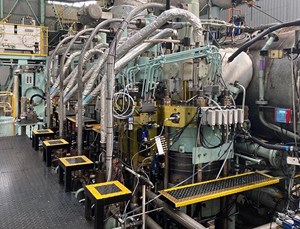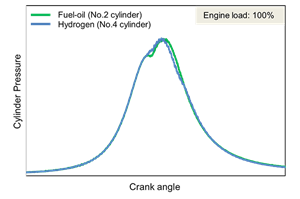News
MITSUI E&S completes H2 combustion operation with a large marine engine
MITSUI E&S and licensor, MAN Energy Solutions SE, have achieved a successful H2 combustion operation of a large marine 2-stroke test engine with a bore size of 50 cm located on the premises of the company's Tamano Factory, aiming for the early launch of H2-related businesses in maritime industry.
This initiative utilizes the Ministry of Land, Infrastructure, Transport and Tourism subsidy project "Maritime Industry Aggregation and Coordination Promotion Technology Development Support Project", which was adopted jointly with Daihatsu Diesel Co., Ltd. in fiscal 2021.
One of the four cylinders of the test engine 4S50ME-T (output 7 MW, rated speed 117 rpm, MEP = 2.10 MPa) was converted to a H2 operation, based on the LNG-fired ME-GI engine design, and high-pressure H2 gas was supplied from the H2 gas supply facility (liquid H2 tank, H2 gas compressor, etc.) completed in October last year. The coupling operation was successfully conducted with this test engine at 100% load without any problems such as H2 leakage.
In this 100% engine load operation using H2 fuel, which ignites easily and requires proper combustion control, the company succeeded in covering the equivalent of 95% of the heat value with H2 fuel, and the cylinder pressure curve was equivalent to that of the other three cylinders operated with conventional fuel. The company also confirmed that the H2 gas supply facility is capable of the stable supply of high-pressure H2 required from the engine. This is the world's first success in H2 combustion operation of a large marine 2-stroke engine with a bore size of 50 cm, and the company is steadily preparing to provide marine propulsion systems that can greatly contribute to the GHG reduction of the maritime industry with the success of the combustion test.
The group will acquire technologies and know-how related to the storage, supply and utilization of H2, which is a next-generation fuel, through the development of H2 fuel propulsion system technologies and H2 supply infrastructure-related technologies and will contribute to the realization of a decarbonized society.



